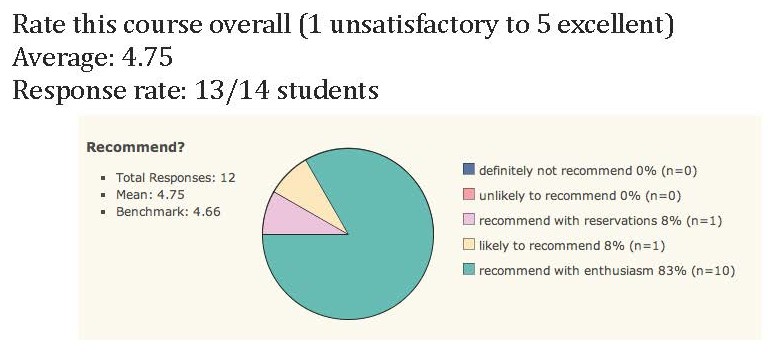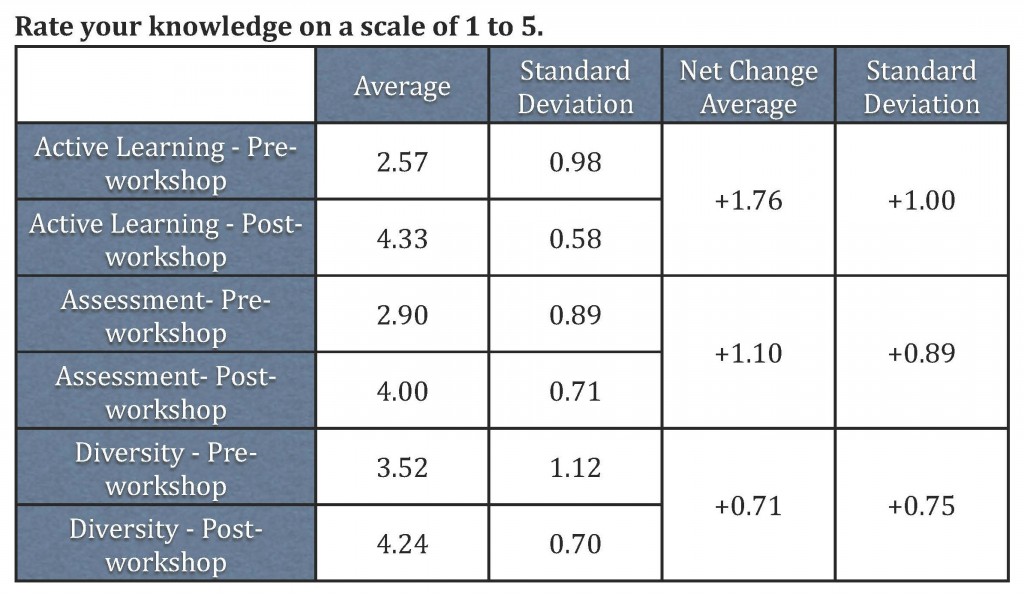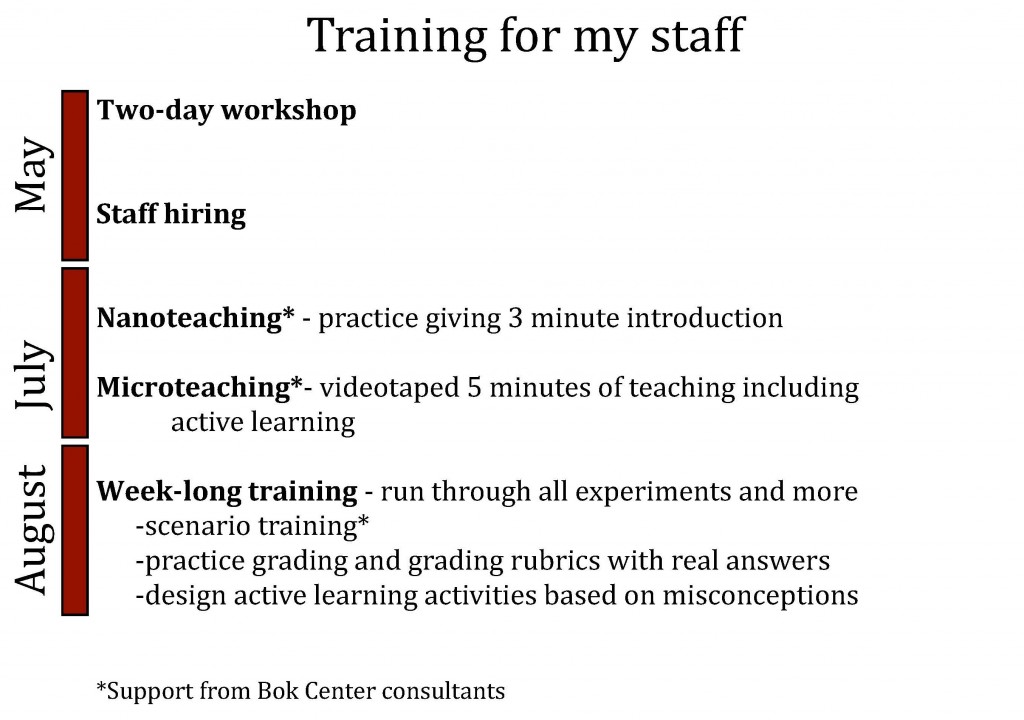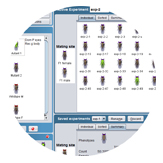 Dr. Mary Ellen Wiltrout
Dr. Mary Ellen Wiltrout
Title: Discovery-based lab courses and teacher assistant training
Group Meeting Date & Time: Friday, November 9, 2012 @ 2:00 pm
View the slides from the group meeting
In her group meeting, Dr. Mary Ellen Wiltrout discussed her experiences as a preceptor for a discovery-based laboratory course and instituting a teaching assistant training program at Harvard University. Dr. Wiltrout’s is a preceptor for MCB52, a Molecular & Cellular Biology course at Harvard University. Prior to accepting this position, Dr. Wiltrout was fortunate to gain invaluable teaching experience and emphasis placed upon teaching through her interactions with three HHMI Professors, Beth Jones, Graham Walker and Rich Losick. Now as a preceptor at Harvard University, she is fortunate to work closely with Professor Briana Burton and Dr. Tom Torello, who both place a strong emphasis on teaching.

Figure 1. Assessment of the Laboratory Course for Adult Learners. The Experimental Molecular & Cellular Biology laboratory course through Harvard's Extension School is a great success with adult learners. On average, the students rated the course as 4.75 out of 5, on a scale where 1 is unsatisfactory and 5 is excellent.
Her tasks as preceptor include managing the teaching staff and laboratory portion of the course, writing problem sets and exams, and serving as a general problem-solver as well as giving lectures that incorporate active learning methods. The course consists of approximately 150 students, primarily sophomores (58%) and juniors (32%). For most students, this course fulfills a concentration requirement and/or pre-med requirement.
The course has a standard structure and consists of three one-hour lectures and one 4-hour laboratory section each week. A recitation section is integrated with the laboratory section in such a way that students perform normal recitation tasks during incubations and breaks in their laboratory experiments. This course structure ensures that the students always have a task to complete.
To implement best teaching practices in the course, Dr. Wiltrout and the other course leaders utilize learning objectives for each class in addition to the three overarching learning goals of the course: 1) learn about the basis of life, 2) learn to think like a scientist, and 3) develop effective strategies for learning. Students who complete this course will not only have created an excellent foundation in molecular biology, but also science in general.

Figure 2. Assessment of the Teacher Training Workshop. Dr. Wiltrout's teaching fellows self-report learning gains in active learning, assessment and diversity following the teaching training workshop.
Dr. Wiltrout has done a significant amount of work optimizing the project-based laboratory design for the course. The laboratory is focused on discovering new binding partners for p53, a critical tumor suppressor gene implicated in approximately 50% of all cancers. While Dr. Wiltrout initiates the bacterial two-hybrid experiment, the students complete the rest of the laboratory steps (including colony PCR, purification, cloning and analysis through Western blotting and EMSA).
Several components of the laboratory course have contributed to its success. First, the students take ownership of the laboratory project. Second, each person in the teaching staff must perform the identical laboratory experiments in the same teaching laboratory prior to the start of the course. As a result, the teaching fellows are particularly well versed in the laboratory assignments and are capable of answering students’ questions. Third, Dr. Wiltrout ensures that all reagents are tested each year and back-up reagents and products are available in the case they are needed. These strategies ensure that there are no impediments to student learning in the course.
Dr. Wiltrout has also adapted the course for use in Harvard’s Extension School. In this course, BIOS E-176: Experimental Molecular & Cellular Biology, approximately 14 students complete the laboratory during 3 weeks in January. In assessment surveys, Dr. Wiltrout found that the adult students loved the lab (Figure 1).

Figure 3. The Teacher Training Schedule. Dr. Wiltrout has implemented a mandatory teaching training program for the teaching fellows with whom she works. The training program extends from May to August and prepares the teaching fellows for the demands of the classroom.
A critical part of the success of MCB52 is the mandatory teaching-assistant training program that Dr. Wiltrout helped design and institute at Harvard University. Prior to 2009, although teaching training experiences were available to graduate students, there was no mandatory teaching training program for MCB graduate students. However, this changed in 2009, at which point a two-day workshop on teaching, modeled after the HHMI Summer Institute, became mandatory for all first-year graduate students in the MCB program. The overwhelming evidence from the workshop is that students want teacher training (Figure 2)!
Dr. Wiltrout has gone one step further and requires more advanced teacher training for her teaching assistants (Figure 3). First, Dr. Wiltrout interviews and selects the 10 graduate students who will comprise her teaching staff, usually in May. Then, in July, the teaching fellows (TFs, who are comparable to teaching assistants, TAs, at MIT) gain practice in teaching and receive feedback through nanoteaching and microteaching experiences. Prior to the course start in August, the TFs perform the same laboratory experiments that the students will perform, undergo scenario training, gain experience in grading assignments, and design active learning lessons to incorporate into their sections. The evidence indicates that the program is incredibly informative for her TFs and they start the semester with knowledge and confidence to teach the course.



